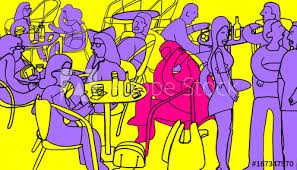Everyone can feel anxious at times in their day to day life. However, while it is normal to feel anxious and worried about the outcome of certain situations, one needs to be able to identify when that anxiety starts hindering and interfering with regular living. When the level of anxiousness is so high that it is becomes disruptive, one should be evaluated for anxiety related disorders.
Among several different types of anxiety related disorders, one that is often mistaken as mere nervousness, and therefore misunderstood, is “Social Anxiety”. This is a term used often for people who tend to be shy in social situations but it encompasses a lot more. People who suffer from social anxiety experience a persistent fear of being the object of judgement, which can negatively affect their personal and professional life. It is an irrational fear of being rejected, ridiculed or scrutinised and, therefore, embarrassed as a result. Socially anxious people tend to avoid otherwise socially-acceptable common interactions such as meeting new people, being in a large group or even asking for small favours and help from others. Their goal is to try to stay away from the spotlight so as to not attract attention, out of the fear of embarrassment, in case of a mishap or failure. This behaviour can often obstruct their progress in workplaces and social lives.

Symptoms of Social Anxiety
There are a few symptoms of social anxiety that can help differentiate it from shyness. People may have physical symptoms of nausea, trembling, excessive sweating, light-headedness, increased heart rate, gastro-intestinal problems when in a triggering situation. The non-physical symptoms of the disorder could present as persistently worrying about being humiliated, obsessively thinking before carrying out simple tasks such as asking someone for a pencil. Anyone suffering from these symptoms would try to avoid social situations. It is, however, not necessary that one would always experience any or all of the said symptoms in a given social situation. There may be times when such people would experience a lower level of anxiety, depending upon the situation. Nonetheless, social anxiety can result in lower self-esteem and a weaker will to participate in activities that include social interactions.
Causes
Social Anxiety can be a result of several reasons. It may be a result of childhood trauma based on bullying or an overprotected childhood. There may also be underlying physical health issues such as hormonal imbalances. They can also be genetic or learnt from an older family member.
There is no test to diagnose an anxiety disorder other than to provide a symptomatic diagnosis. A mental health professional can diagnose, on the basis of symptoms whether and what level of social or any other kind of anxiety disorder someone has. Based on the diagnosis, they would suggest proper treatment.
Possible Treatment Options
While taking care of someone dealing with any form of anxiety disorder, including social anxiety, it is advisable not to reiterate to them that their behaviour or fear is irrational. It is highly likely that they themselves realise that they are being irrational and any such remarks may induce further distress and anxiety.
Other than some general measures that can be taken at home such as getting adequate sleep or avoiding certain foods, professional treatment is also needed in order to help overcome this mental disorder. Treatment options include Cognitive Behavioural Therapy, which helps to shape the thought process and transforming negativity into positivity; Exposure Therapy, which aims at focusing on facing the irrational fears rather than avoiding them so as to become desensitised to them; and Group Therapy, which encourages building social connections so that participants can aid each other overcome their fear.

While social anxiety is a mental health disorder and not a disease, it should still not be taken lightly or be brushed away by classifying or mistaking it as shyness. The person living with such a disorder may not be able to experience life to its full potential. They need to understand themselves and their anxiety better and seek treatment in order to live life fully before their behavioural problems cause any significant damage to their personal and professional relationships.







